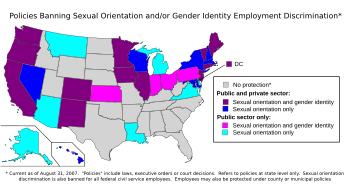UN passes bullying resolution: Western nations lament lack of ‘sexual orientation’ protections
 |
| Color-coded map displaying civil rights protection for employees based on sexual orientation and/or gender identity in the United States (current as of August, 2007) (Photo credit: Wikipedia) |
The United Nations decided to take on bullying, with the first ever stand-alone resolution on the subject in the General Assembly.
Once the resolution was adopted by consensus on Monday, countries behind it wasted no time in making their intentions known.
“We regret that bullying because of the sexual orientation and gender identity of children or their parents was not reflected in the resolution,” said the European Union.
The United States echoed those sentiments in an ad hoc intervention to highlight specifically that health concerns of LGBT youth must be reflected in the report of the Secretary General mandated in the resolution. Several countries in Latin America, Australia, and Nordic countries made statements to also express frustration for failing once again to have a resolution employ the expression “sexual orientation and gender identity.”
The bullying resolution is widely recognized as a stepping-stone to promote the notion of “sexual orientation and gender identity” in UN policy. The terminology was rejected during negotiations, but the resolution requests a report on bullying from the UN Secretary General, which is expected to highlight bullying of children who identify as lesbian, gay, bisexual, and transgender (LGBT).
The African Group said “there is no common understanding” on bullying, after hearing the European statement, explaining that a report from the secretariat in two years time would be a better basis for negotiations.
Earlier this month, during negotiations, one delegate complained to the Friday Fax that his country has “serious problems” to deal with, and his delegation had neither the time nor inclination to dwell on bullying.
There is currently no consensus on “sexual orientation and gender identity” at the United Nations. Every time the term comes up in a resolution it forces countries to a vote. This year, opponents of the term gained ground.
111 delegations voted in favor of a resolution against extrajudicial killings last week—the only resolution of the General Assembly where the terms appear—and 66 abstained because they view it as a Trojan horse for special new LGBT rights. Two years ago 117 countries voted in favor of the same resolution. A last ditch attempt by Islamic countries to delete the reference to “sexual orientation and gender identity” failed. 53 countries voted in favor of the amendment, 9 more than two years ago.
Charges of bullying are commonly leveled at UN headquarters against wealthy countries for using their wealth and resources to “impose” their politics and ideology on the rest of the world.
Along those lines, countries complained of the trends at the Human Rights Council on Tuesday this week. Belarus called for a vote on a resolution on the work of the council saying that countries “manipulate” human rights in an “atmosphere of politicization and polarization.”
The council adopted a resolution this year, only the second on the subject, asking for a report from the High Commissioner for Human Rights on discrimination and violence because of sexual orientation and gender identity. The previous resolution resulted in a report that claimed states should recognize same-sex unions, sex changes, as well as special protections in asylum law, criminal law, and civil law for individuals who identify as LGBT.
“The Council must be devoid of any resolutions that impose unacceptable obligations on member states,” complained Ambassador Usman Sarki of Nigeria. He invited wealthy countries to stop pressuring them to change.
“We do not wish to be seen as imposing our values”, he said. But he went further.
“We stand against the unacceptable social behavior that is now being masqueraded as human rights… against which the Nigerian people have legislated,” he said, adding, “sexual orientation and gender identity is not and will never in the foreseeable future be a human rights issue for Nigeria.”
These sentiments were echoed in a statement from the African Group and in statements from Islamic countries.
In spite of their modest resources and personnel limitations countries from Africa are making a big impact at the United Nations.
Last week they delivered a scathing message that they would not accept or support the promotion of new notions of sexuality that are being advanced in schools in the developed world.
They were also instrumental in the adoption of a resolution on the family that once again omits the phrase “various forms of the family.” The same countries frustrated by the bullying resolution complained that same-sex couples were excluded by omitting that phrase.
Reprinted with permission from C-Fam.

